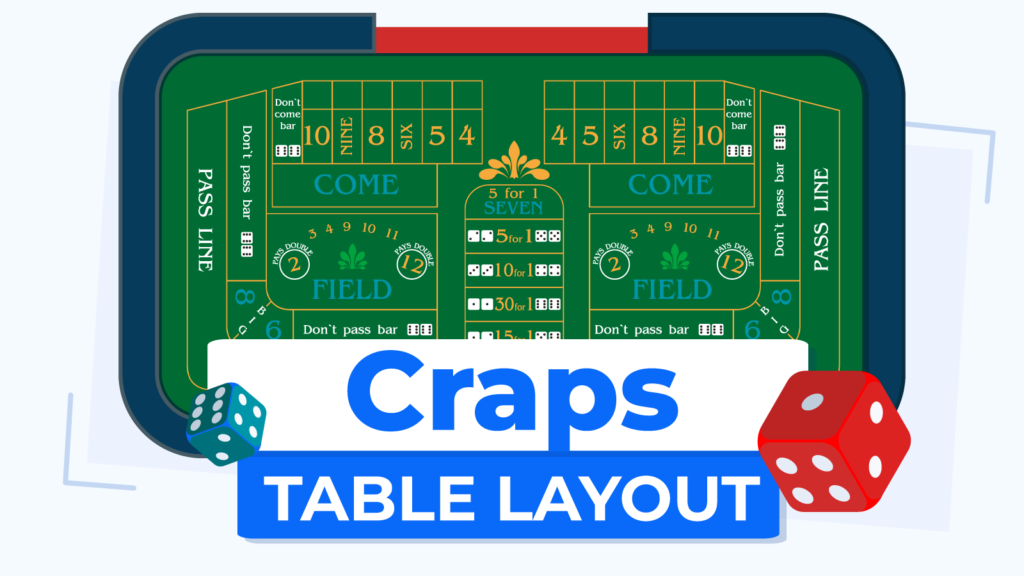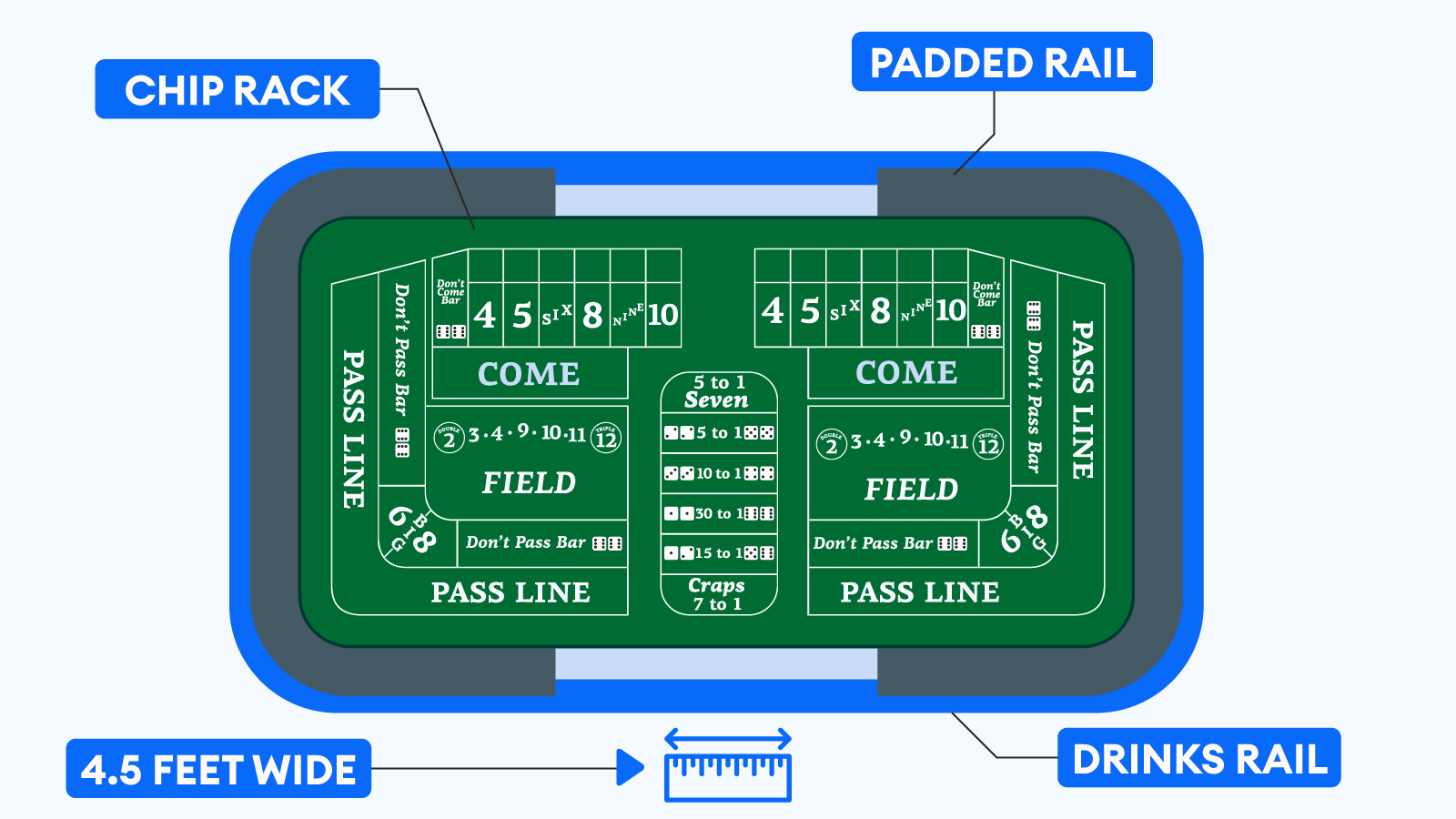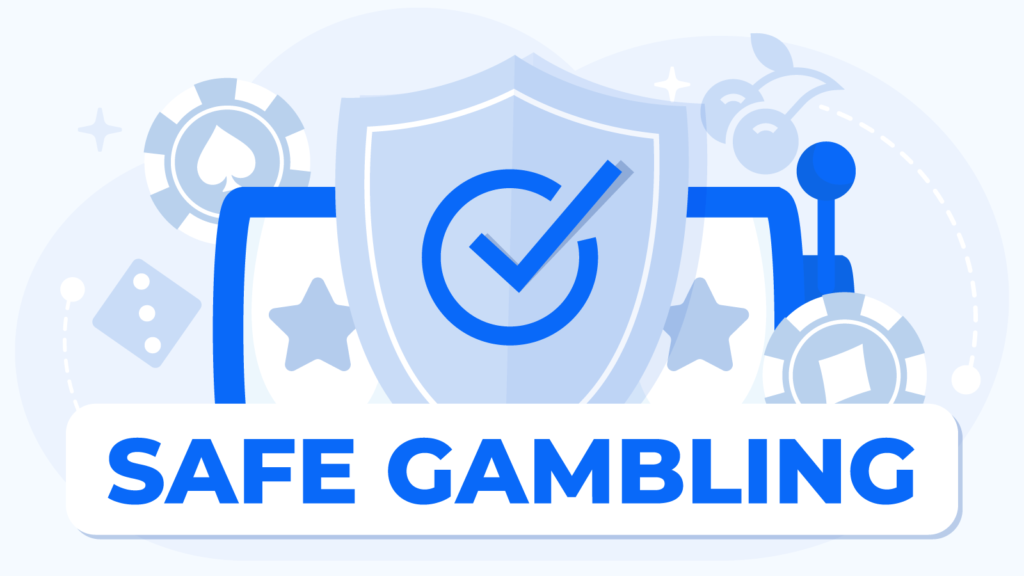
Here Is What You Should Know About the Craps Table Layout
Knowing a craps table layout can boost your success odds significantly.
This is how our article can help:
- It provides a detailed description of the layout of the Craps table, including the main bets areas and additional table elements, like the drinks rail or the chip rack.
- You’ll learn how the table layout influences your betting options.
- Our experts explain Craps table odds according to the bet you choose to make
- You’ll understand the role of each staff member present at the Craps table and how they can help you during the game.
- We share expert tips on betting at a Craps table.
The Craps Table Layout

The size and finish of a casino craps table depend on the type of game you are playing. Still, the standard features are very much the same.
Tips
Online craps casinos in our experts’ selection provide two main types of craps in their gaming catalogues: classic and live.
The classic versions are based on Random Number Generators, and can be found in many of the best NZ online casinos. On the other hand, the live craps games share the same layout with their land-based casino.
One of the scariest things for any player is the dice layout’s complex appearance. Still, don’t let that put you off.
It is easier to learn the craps layout if you break it down into smaller pieces.
Key betting tips to remember:
- Your starting point when analysing the board is its centre. All proposition bets are found there.
- Some NZ players may swear by their payout potential.
- Such bets have a high house edge, meaning that your odds are poorer and that the casino wins those bets more often, on average.
Your best craps betting options are:
Your best bet choices are the Free Odds and Pass Line because not only is the house advantage lower, but losses are typically less frequent with this type of bet.
Important reminder: Check the casino’s game list if you choose a no deposit bonus from our top-notch selection. Some online casinos may not have your preferred craps version.
Other elements of a craps table include:
- Padded rail: This rail runs at the top edge. It is padded so that players may lean on it.
- Chip rack: This is next to the rail, where the players store their chips. They are separated into different sections, so every player has their own rack.
- Drink rail: This runs around the board’s perimeter and is where players can put their drinks so they don’t spill onto the board.
The standard length of a dice layout is around 11ft and 10 inches.
Craps Table Odds
| Bet Type | Payout |
|---|---|
| Pass or Come Line Bet | 1:1 |
| Don’t Pass / Don’t Come Line Bet | 1:1 |
| Numbers 4 or 10 | 2:1 |
| Numbers 5 or 9 | 3:2 |
| Numbers 6 or 8 | 6:5 |
| 3, 4, 9, 10 or 11 | 1:1 |
| 2 or 12 | 30:1 |
| 3 or 11 | 15:1 |
| Any 7 | 4:1 |
| Any craps (2, 3 or 12) | 7:1 |
| Hard Hop | 30:1 |
| Easy Hop | 15:1 |
Here’s How Craps Bets Work

Pass/Don’t Pass bets: You wager on the shooter to pass (or not) by rolling out a natural (7 or 11) or winning the point.
Come bets: You win if you roll a natural (7 or 11).
Don’t Come bets: You win if the dice outcome is 2, 3 or 12. In street dice slang, a roll of 2 is called ‘snake eyes’.
Props bets: These are one-roll bets that you can place on any roll. You can bet on the shooter rolling a:
- 7
- Craps
- Ace Deuce (3)
- Aces (2)
- Boxcars (12)
- Horn (2, 3, 11 or 12)
Place bets: Bet on any number. Suppose you roll that number before a 7. In that case, you win.
Field bets: You lose on any 5, 6, 7 or 8 rolls.
Big 6 and Big 8 bets: You bet on the shooter rolling a 6 or 8 before a 7.
Important
If you want a deeper understanding of your odds, check an expert street craps rules guide. You’ll improve gambling results if you update your craps vocabulary and understand the game’s origin.
Craps Table Staff
There are several different dealers involved in a game of craps, four in total:
- The floorman
- The boxman
- The stickman
- The two dealers
The floorman is the game’s manager. In some casinos, he’s responsible for supervising more than one table at once. He can approve credit for players and observe the players’ overall conduct.
The boxman sits and watches the action unfold at one particular table. His role is to follow the other dealers and observe how and how much each player wagers.
As well as observing, he is in charge of exchanging chips for money.
If a dispute arises, his job is to mediate and settle the issue.
The stickman is called so because his role is to move the dice around the table with his long specific stick. He very much controls a dice round’s pace.
At the start of the game, the stickman moves three sets of dice to the shooter and asks them to pick one.
After each throw, the stickman returns the dice to the shooter. He also calls out the numbers and effects of some of the bets. The stickman is also in charge of organizing the centre bets.
The role of the two dealers is to communicate with the players and collect and pay off the bets made on each side of the board.
They keep bets well organized, collect any losing bets and pay out winning bets.
Playing at a Casino Craps Table
- Players must request casino credit, usually by throwing cash at the board.
- In the NZ live casinos we list, this step is equivalent to making a deposit and claiming a bonus, then accessing the relevant live craps room.
- The player will then be given the appropriate value of chips by the boxman, who counts out the funds from the casino bankroll.
- In online settings, your funds are credited automatically.
- The chips are given to the dealer, who then hands them to the player.
- You can easily see how the online casino industry can do without all these intermediaries in the interest of more straightforward gameplay.
- The game’s first roll is the come-out roll, with three possible outcomes: a natural, craps or point.
Tips
New NZ players should read our in-depth player guides to get familiar with the online casino environment and its rules.
Remember:
- A natural is when you roll a 7 or 11. If this happens, you win and get to roll again.
- Crapping out is when you roll a 2, 3 or 12. You lose, but the round isn’t over yet, and you roll again.
- If you roll any number between 4, 5, 6, 8, 9 or 10, it’s called a point.
- In a live casino, the dealer marks your point (the rolled number) on the table.
- You must then roll the dice again and hope for the same number.
- It doesn’t have to be the same dice combination. If you get the same number, you win the round.
We know this information may seem complicated at first. For this reason, it may be easier if you first learn Craps odds and payouts before you start betting at a Craps table.
Did we cover everything?
Your feedback is crucial to us in responding to all your questions, which is why we prioritize it. Leave us your queries and impressions in the comment section below!
F.A.Q.
Who invented Craps?
By most accounts, the game was invented by Sir William Tyre in 1125.
What are the main components of a dice layout?
Each end has Pass Line, Come, Place, Field and other wagers sections. The centre section features the Hardways and One Roll bets. The board’s ends are mirror images of each other.
What are the dimensions of a casino craps table?
The playing surface is around 11ft 10 inches long and about 4 feet wide. With the padded rest, it reaches approximately 15ft by 5ft.
Who is in charge of what happens in dice?
It is run by the boxman, two base dealers who stand on each side of the boxman and the stickman.
What is the outer edge of the felt table layout in Craps called?
The outer edge of the felt is the padded rail. The outermost bet imprinted on the table is the pass line.
















